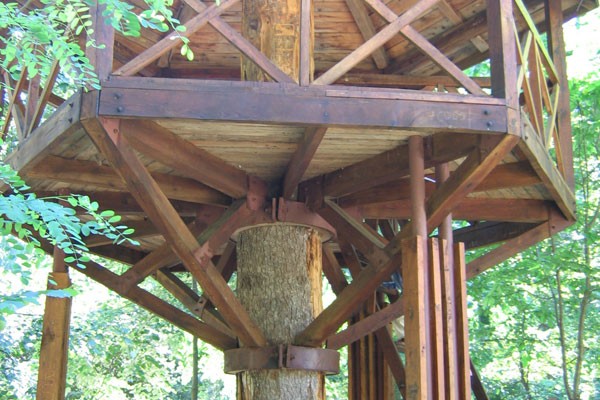For some time I’d wanted to build a new writing space that would also double as a bedroom. But to build a bedroom, one has to construct a space that is conducive to dreaming. That is, after all, what bedrooms are for, just as kitchens are primarily designed to facilitate the sharing of food. In his great book The Poetics of Space, Gaston Bachelard says that the purpose of an entire house should be to support the dreamer.
The last time I did some building, about a decade ago, I didn’t bother with plans; the builder and I sketched a few shapes on an envelope. What we finished up with was something I didn’t even know I had it in myself to produce. For the first time in many years – if not ever – I was delighted with myself.
I am a reasonable builder’s offsider, provided that the builder is incredibly patient and doesn’t mind having to re-teach me tasks we’ve already done several times before. I can lay decking and flooring, but a baboon could be trained to do that. It’s when a job requires precise measurement that my mind goes to pieces.
This time around, for the writing-space-bedroom, I didn’t even bother with the back of an envelope. I worked out that the critical thing was to be guided by a kind of political hypothesis as to what experiences such as dreaming and reverie are for. Of course, one still has to engage with the world of physics to be able to build, but I think that, armed with a copy of Bachelard and Christopher Alexander’s legendary A Pattern Language, anyone can build anything.
It was only when I sat down with a friend of mine to brainstorm that I realised what I really wanted to build was a library in which I could sleep.
You could say that I moved back to Nimbin four years ago in order to learn to daydream. I did in fact mention this to a few people before I left Brisbane, only to have my words met with a kind of mute anger, as though I had insulted my listener and they were trying to work out how I had done it. The reality was that being able to daydream had become a matter of survival. Perhaps it seemed nonsensical to people that I was positioning the capacity for reverie as a politically coherent act, as though I were trying to find an excuse to lie in a hammock all day blithely drinking gin and tonics while the rest of the world slaved in the mines.
I worked with two builders on the library, an Israeli-Australian whom I shall call Z and a Filipino-Australian I shall call X.
Z has lived in Australia for just under a decade; X for about twenty years. Both had come to Australia as backpackers and found something about Nimbin that they thought could accommodate their dreams and their politics.
In between the gaps in the slow and unpredictable process of building we talked of childhoods, futures and histories. Z had done his three years of mandatory military service in the Israel Defence Forces. It struck me that at any given time the entire population of Israelis aged between eighteen and twenty-one are completely taken out of circulation. Z said that he had found the ability to competently use an automatic weapon to be of limited use in civilian life.
X said he had grown up on boats and in trees. He said that he had been fortunate to have experienced limited racism since he had emigrated to Australia. When he was a child, his grandfather had told him, ‘If you want to be rich, first you have to be rich here,’ striking his heart with his fist. X told me that when he had encountered people who racially insulted him, he worked from the assumption that there was something wrong with them: not only were they miserable, they also had a distorted view of what made life worthwhile, and this was going to land them in serious trouble. X said that this attitude not only prevented him being upset, but also had a practical benefit in that he was sometimes able to engage in a real conversation with his abuser.
Anyway, the library is half done: frame, roof, half the floor and some walls. I’ve spent months sitting in its shell and thinking. It can, of course, seem weird or indulgent to build a place to think in. But we build special rooms in which to shit, so I figured that building a room for the deliberate cultivation of reverie, to think about thinking, was worth a shot. I’ve re-imagined my whole life here and come to understand things I thought I never would. Things I thought were beyond me, that led me to believe maybe there was something wrong with me because I didn’t understand.
Actually, I’ve come to realise, I just hadn’t done enough thinking.



